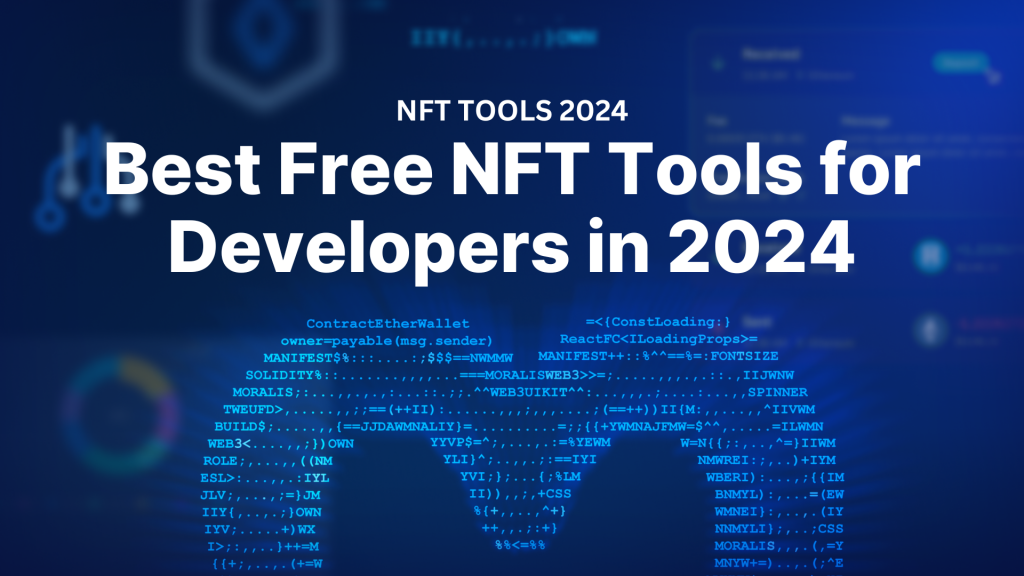
In today’s article, we will not only examine the best free NFT tools for developers in 2024 but also make a fair comparison of NFT tools. In doing so, you’ll discover that Moralis’ NFT API stands out as the industry’s premier interface regarding speed, features, and supported chains. With this tool, you can effortlessly get NFT balances, transfers, metadata, and much more across all major blockchains with only single lines of code. So, if you’re looking to build NFT-based projects, the tools presented in this article will be excellent for you, and Moralis’ NFT API will be your no-brainer choice!
To highlight the power of Moralis’ NFT API, here’s a little sneak peek of three examples of prominent endpoints you’ll likely find helpful:
getWalletNFTs()– Get all NFTs owned by a wallet:
const response = await Moralis.EvmApi.nft.getWalletNFTs({ "chain": "0x1", "address": "0xff3879b8a363aed92a6eaba8f61f1a96a9ec3c1e" }); getWalletNFTTransfers()– Fetch all NFT transfers of an address:
const response = await Moralis.EvmApi.nft.getWalletNFTTransfers({ "chain": "0x1", "address": "0x1f9090aaE28b8a3dCeaDf281B0F12828e676c326" }); getNFTMetadata()– Query NFT metadata for any token:
const response = await Moralis.EvmApi.nft.getNFTMetadata({ "chain": "0x1", "address": "0xb47e3cd837dDF8e4c57F05d70Ab865de6e193BBB", "tokenId": "1" }); If you’d like to learn more about Moralis’ NFT API and why it stands out as the industry’s premier interface, join us in this article as we explore and compare the best free NFT tools for developers. Also, if you want to use the Moralis NFT API yourself, don’t forget to sign up with Moralis. You can set up an account free of charge, and you’ll gain access to all our industry-leading APIs instantly!
Additionally, if you’d like to explore all NFT tools – even the ones not featured in this article – check out Moralis’ dapp store: Web3 Wiki!
Overview
We’ll start today’s article by exploring and comparing the best free NFT tools for developers. In doing so, we’ll dive deeper into the following three APIs:
- Moralis’ NFT API
- OpenSea’s NFT API
- Alchemy’s NFT API
From there, we’ll explore Moralis’ NFT API further, as Moralis stands as the industry’s top interface for NFT data. In doing so, we’ll highlight the benefits of working with Moralis, cover some prominent endpoints, and give you a brief tutorial on how to get the NFT balance of any wallet in three steps.
Towards the end of the article, we have dedicated a few sections to explore the ins and outs of free NFT tools. As such, if you’re unfamiliar with what they are, we recommend starting in the ”What are NFT Tools?” section.
Otherwise, join us as we kick things off by diving straight into our list of the best free NFT tools for developers in 2024!
Free NFT Tools Review – List of Free NFT Tools for 2024
Whether you’re building an NFT marketplace or Web3 wallet, you’ll likely want to leverage an NFT API to streamline the process of fetching data from the blockchain. However, the market is full of prominent free NFT tools for developers, making it challenging to find a good fit for your needs. As such, to help you in this endeavor, we have prepared a list of the top three free NFT APIs below:
- Moralis’ NFT API
- OpenSea’s NFT API
- Alchemy’s NFT API
So, without further ado, let’s dive straight into the #1 pick on our free NFT tools list: Moralis’ NFT API!
Moralis’ NFT API
Moralis’ NFT API is an industry-leading, cross-chain compatible interface and NFT data analytics tool offering unparalleled speed and performance via lightning-fast CDNs, premier features, extensive token coverage, and much more!

But what are some of the main features of Moralis’ NFT API?
- Real-Time & Historical NFT Data: Fetch real-time and historical NFT data, including transfers, balances, metadata, etc., with only single lines of code.
- Enriched Metadata: Access both normalized and fully enriched metadata for individual tokens and NFT collections alike.
- On-Chain Price Data: Query and easily integrate on-chain price data into your dapps, including last sale prices and lowest sold-for prices.
- Optimized Image Previews: Get dynamically sized image previews and user-friendly formats for any NFT use case.
- Advanced Spam Detection: Filter and remove unwanted NFTs with collection spam indicators.
- Alerts & Notifications: The NFT API works perfectly in unison with Moralis’ Streams API, allowing you to seamlessly set up real-time notifications on NFT trades, marketplace orders, and new mints.
- And much more!
OpenSea’s NFT API
OpenSea is a well-known NFT marketplace, and in combination with their platform, they also offer a comprehensive API. OpenSea’s NFT API provides many features, allowing Web3 developers to build NFT-based projects easily!

So, what are some prominent features of the OpenSea NFT API?
- Get NFTs: Get NFTs by wallet address, type, or collection.
- Fetch NFT Activity Data: Fetch NFT events, including listings, sales, transfers, and more.
- Query Account Information: Query account data from any user wallet.
- And more.
Alchemy’s NFT API
Alchemy is a blockchain developer platform providing several tools for Web3 developers, and in their suite, you’ll find the Alchemy NFT API. This interface offers features and tools to help developers build NFT-based platforms more easily. And with this API, it’s possible to launch, analyze, verify, and display NFTs!

So, what are some Alchemy NFT API features?
- Fetch NFTs: Fetch all NFTs of a collection, address, or cryptocurrency wallet.
- NFT Minting: Use the Alchemy NFT API to mint and deploy tokens with minimal Web3 development experience.
- Spam Detection: Filter airdropped and spam NFTs.
- And more.
Comparison of Free NFT Tools
Now, with an overview of our three free NFT tools for developers, we’ll take this section to compare them, and to kick things off, here’s a table briefly summarizing their differences and similarities:
| Comparison of Free NFT Tools | |||
| Moralis’ NFT API | OpenSea’s NFT API | Alchemy’s NFT API | |
| Speed: | #1 NFT API (Winner) | #2 NFT API (Second Place) | #3 NFT API (Third Place) |
| Features: | Historical and real-time NFT data, price data, enriched metadata, spam detection, Web3 alerts, optimized image previews, and more. | Real-time NFT data, price data, metadata, listing data, profile information, and more. | Real-time NFT data, price data, metadata, spam detection, rarity score, webhook support, and more. |
| Supported Chains: | Ethereum, Polygon, BNB Smart Chain (BSC), Arbitrum, Avalanche, Cronos, Gnosis, Chiliz, Fantom, etc. | Ethereum, Polygon, BNB Smart Chain (BSC), Avalanche, Arbitrum, etc. | Ethereum, Polygon, Optimism, Arbitrum, Base. |
- Speed: When it comes to speed, Moralis’ NFT API clearly stands out as the industry’s #1 interface. This is based on a test we conducted on Alchemy’s website. Moralis claimed first place, OpenSea second, Alchemy third, and QuickNode fourth. Check out the test yourself down below:
- Features: The NFT APIs from Moralis, OpenSea, and Alchemy all offer the basic functionality for building NFT-based platforms. However, when it comes to unique, cutting-edge features – such as enriched metadata, optimized image previews, Web3 alerts, advanced spam detection, etc. – the Moralis NFT API outshines the competition.
- Supported Blockchains: Moralis’ NFT API also supports more chains than both NFT APIs from OpenSea and Alchemy. So, when it comes to coverage, Moralis has a clear edge.
When it comes to speed, features, and supported chains, we can determine that Moralis’ NFT API stands out as the industry’s premier option. In the next section, we’ll explore the Moralis further!
What is the Best Free NFT Tool for 2024?
Based on speed, unique features, and supported chains, Moralis’ NFT API clearly stands out as the industry’s premier interface. As such, in this section, we’ll dive deeper into the NFT API to further explain why you should leverage this tool in your Web3 development endeavors!
The Moralis NFT API covers more than three million collections, including everything from well-established projects like Doodles, CryptoPunks, and Pudgy Penguins to tokens that dropped just a few seconds ago. What’s more, the NFT API is chain agnostic, supporting all major blockchain networks, including Ethereum, Solana, Polygon, BNB Smart Chain (BSC), and many others.
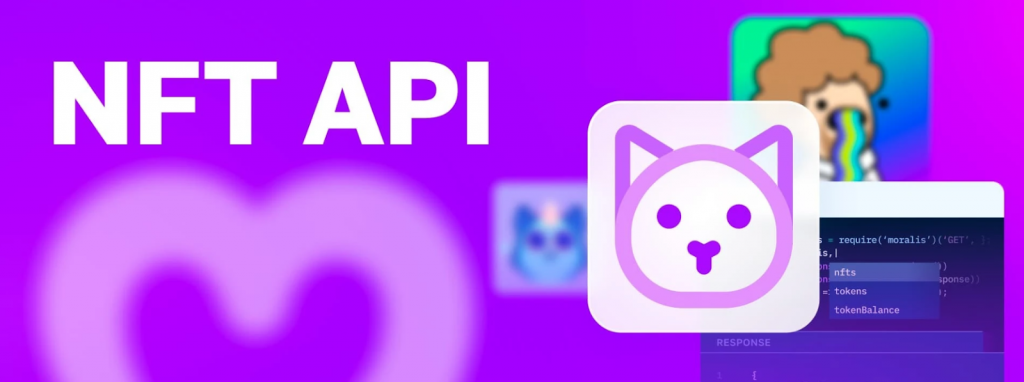
So, why should you use Moralis’ NFT API?
- Top Performance: Not only does Moralis’ NFT API shine when it comes to speed. You can take any metric – whether you want to judge by reliability, competitive pricing, or anything else – Moralis always comes out on top.
- Extensive Ecosystem: Moralis’ Web3 API suite comprises multiple other interfaces you can plug and play with the NFT API to build more sophisticated dapps. Some prominent examples include the Wallet API, Token API, and many others.
- Scalability: All of Moralis’ APIs are built to scale. So, when your projects grow, you don’t have to worry about their performance, as we’ll have no trouble handling the increase in traffic.
Now, with an overview of the best free NFT tool, let’s explore some prominent endpoints of the Moralis NFT API!
Endpoint Examples
With the Moralis NFT API, you can seamlessly get NFT wallet balances, token transfers, metadata, and much more with only single lines of code. In this section, we’ll introduce you to three prominent endpoint examples:
getWalletNFTs()– Fetch all NFTs owned by an address:
const response = await Moralis.EvmApi.nft.getWalletNFTs({ "chain": "0x1", "address": "0xff3879b8a363aed92a6eaba8f61f1a96a9ec3c1e" }); getWalletNFTTransfers()– Get all NFT transfers of a given wallet:
const response = await Moralis.EvmApi.nft.getWalletNFTTransfers({ "chain": "0x1", "address": "0x1f9090aaE28b8a3dCeaDf281B0F12828e676c326" }); getNFTMetadata()– Query metadata for any NFT:
const response = await Moralis.EvmApi.nft.getNFTMetadata({ "chain": "0x1", "address": "0xb47e3cd837dDF8e4c57F05d70Ab865de6e193BBB", "tokenId": "1" }); If you’d like to explore all our endpoints, check out the official NFT API documentation page!
Free NFT Tools Tutorial: How to Fetch the NFT Balance of a Wallet in 3 Steps
In this section, we’ll give you a quick tutorial on how you can call the various endpoints of the Moralis NFT API. To do so, we’ll use the getWalletNFTs() endpoint as an example and show you how to get all NFT tokens owned by a user address in three steps!
- Prerequisites: This is a JavaScritpt tutorial. As such, before you continue, ensure you have the following ready: Node.js v14 and npm or Yarn.
- Step 1 – Get a Moralis API Key: Sign up with Moralis, go to the admin panel, navigate to the ”Settings” tab, scroll down, and copy your API key:
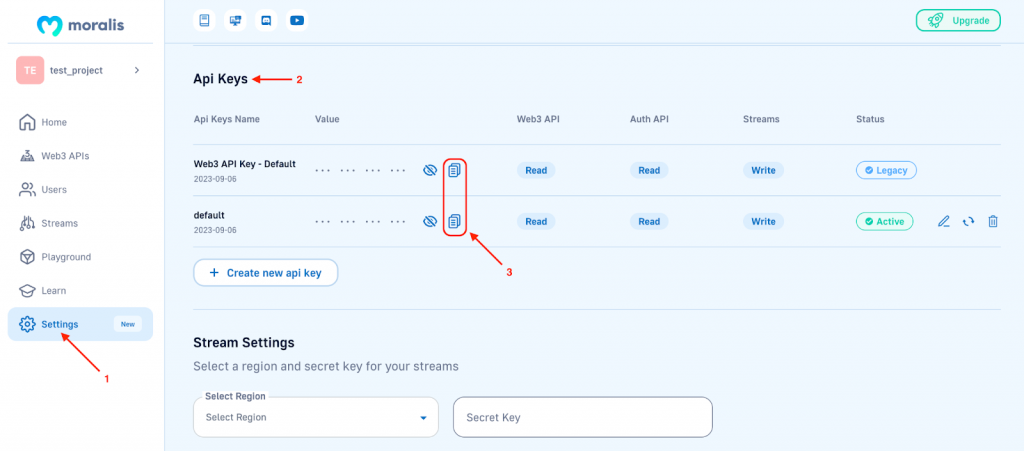
- Step 2 – Write a Script Calling the
getWalletNFTs()Endpoint: Set up a new project in your preferred IDE and run the following terminal command in the root folder to install the Moralis SDK:
npm install moralis @moralisweb3/common-evm-utils
Next, create a new ”index.js” file and add the following code:
const Moralis = require("moralis").default; const { EvmChain } = require("@moralisweb3/common-evm-utils"); const runApp = async () => { await Moralis.start({ apiKey: "YOUR_API_KEY", // ...and any other configuration }); const address = "0x26fcbd3afebbe28d0a8684f790c48368d21665b5"; const chain = EvmChain.ETHEREUM; const response = await Moralis.EvmApi.nft.getWalletNFTs({ address, chain, }); console.log(response.toJSON()); }; runApp(); You then need to make some small alterations to the code. First, add your Moralis API key by replacing YOUR_API_KEY. From there, you also need to configure the address and chain parameters to fit your query:
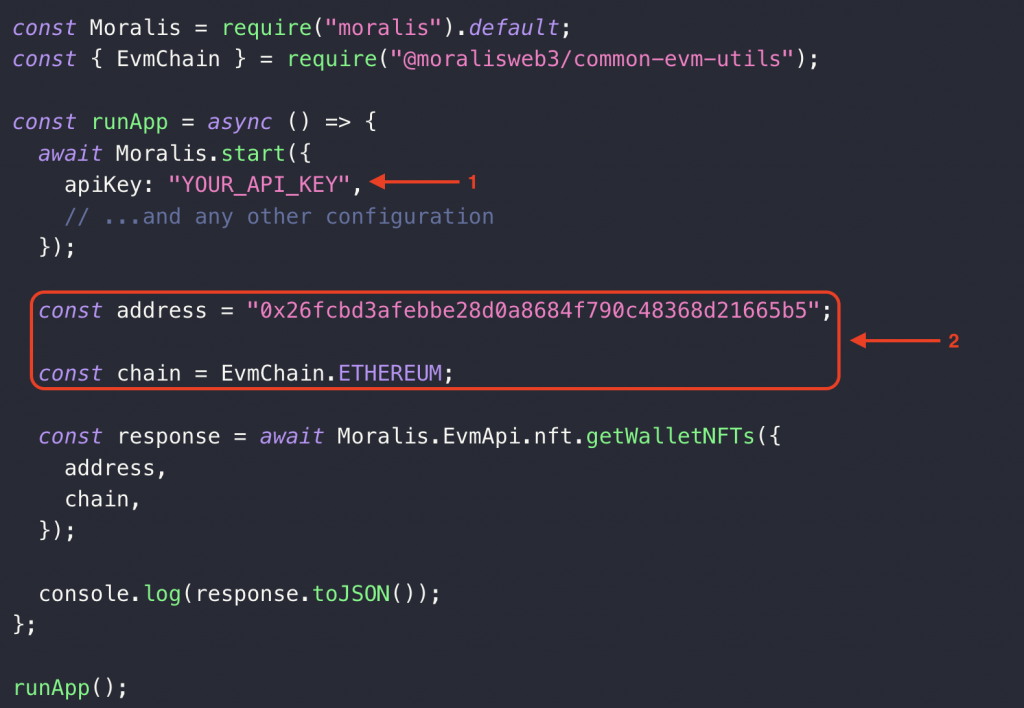
- Step 3 – Run the Code: For the final step, open a new terminal,
cdinto the project’s root folder, and run this command to execute the code:
node index.js
In return, you’ll get a response containing an array of all tokens held by the wallet in question. It should look something like this:
{ //... "result": [ { "token_address": "0x67f4797d84acfe5e42110051b46fa09e14a3e3f0", "token_id": "1", "owner_of": "0xff3879b8a363aed92a6eaba8f61f1a96a9ec3c1e", "block_number": "18601661", "block_number_minted": "18599412", "token_hash": "17d5f82bfbd6bd3943e3280ff5456514", "amount": "1", "possible_spam": false, "contract_type": "ERC1155", "name": "Visit apyape.org to claim rewards", "symbol": "apyape.org", "token_uri": "https://ipfs.moralis.io:2053/ipfs/QmQSLpjTb5irdxTGjUwgg6fGDmnxowca18n6vHYGJADE9J", "metadata": "//...", "last_token_uri_sync": "2023-11-18T14:47:19.214Z", "last_metadata_sync": "2023-11-28T15:05:45.244Z", "minter_address": "ERC1155 tokens don't have a single minter", "verified_collection": false }, //... ] } Congratulations, you now know how to get the NFT balance of any wallet!
From here, you can follow the same steps to call any other endpoint. All it requires is some minor code configurations during the second step!
To understand what NFT tools are, we initially need to explain NFTs. As such, let’s kickstart this section by answering the question, ”What are NFTs?”.
NFTs – short for ”non-fungible tokens” – are entirely unique cryptographic tokens often used to represent ownership of digital or physical items. This can be everything from digital art to real estate. Some examples of common NFTs are collections like CryptoPunks and Pudgy Penguins.
If you’d like to dive deeper into these tokens, check out our NFT article!
Nevertheless, with an overview of NFTs, we can now explain what NFT tools are!

Put simply, NFT tools are software platforms or websites that allow you to create, manage, sell, buy, analyze, and trade NFTs. What’s more, some even enable you to build your own NFT-based projects.
However, there isn’t a single platform/website designed for all these use cases, and multiple types of NFT tools exist. If you’d like to learn more about this, join us in the next section as we explore some common types of NFT tools!
Different Types of NFT Tools
As we mentioned above, there are multiple types of NFT tools, and in this section, we have divided them into two categories: NFT tools for developers and NFT tools for traders. As such, let’s explore each, starting with the former!
NFT Tools for Developers
The most common NFT tools for developers are NFT APIs. But what exactly are they? And how do they work?
An NFT API – short for ”application programming interface” – is a set of rules, protocols, and methods allowing you to seamlessly query and integrate NFT data into your Web3 projects. In essence, an NFT API basically abstracts away the complexity and challenges associated with querying blockchain networks for wallet balances, transactions, metadata, and so on.
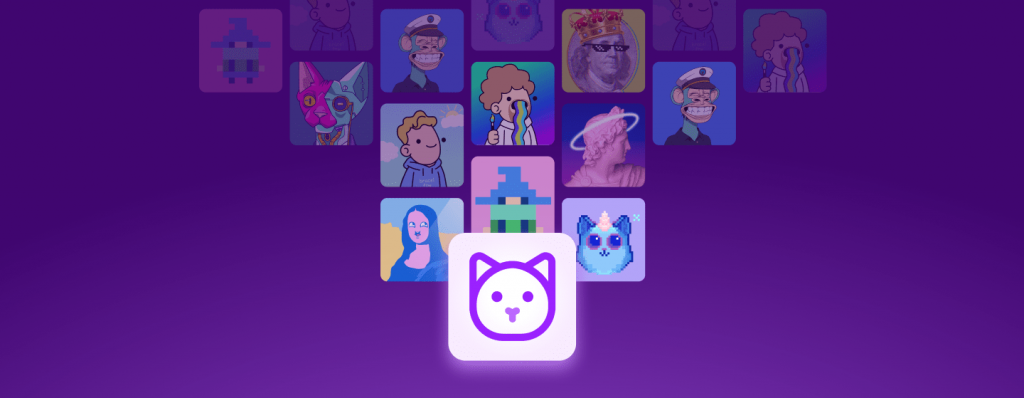
By leveraging tools like these, you can save an abundance of development time and resources, making it a no-brainer if you are building NFT projects!
If you’d like to learn more about these interfaces, check out our free NFT API guide!
NFT Tools for Traders
There are multiple different NFT tools for traders, and in this section, we’ll explore three prominent examples:
- Web3 Wallets: Web3 wallets are software platforms allowing traders to store and manage their NFTs. There are many wallet providers, and some prominent examples include MetaMask, Phantom, and Rainbow.
- NFT Analytic Tools: NFT analytic tools are websites and applications allowing traders to explore NFT projects, track crypto whales, analyze tokens and collections, and much more. As such, they essentially allow traders to stay ahead in the NFT investment space. Some examples of prominent platforms include Dune Analytics, Etherscan, etc.
- NFT Marketplaces: NFT marketplaces are digital platforms that allow users to buy and sell NFTs. There’s a wide range of marketplaces, and they typically have their own niches and unique features. Some examples include OpenSea, NFTrade, and Rarible.
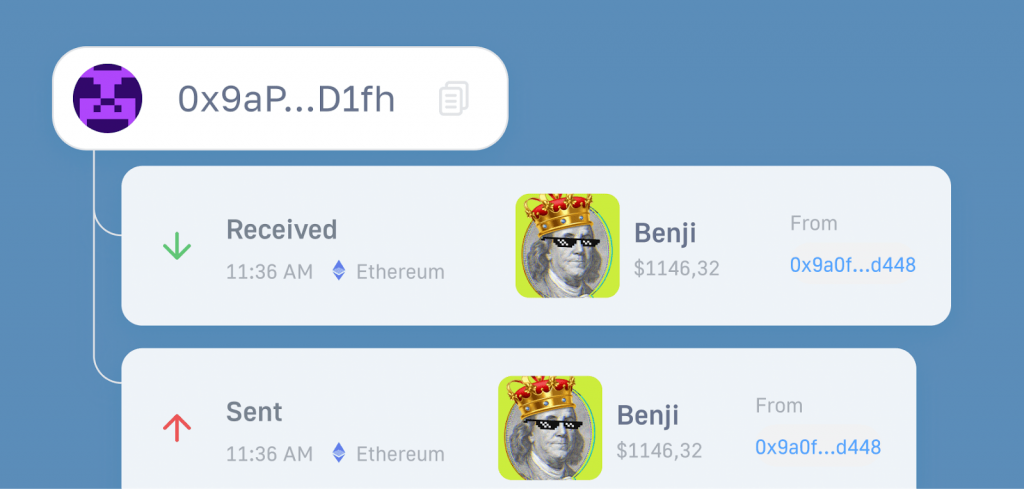
Summary: Best Free NFT Tools for Developers in 2024
In today’s article, we explored the best free NFT tools for developers in 2024. In doing so, we covered the following three NFT APIs:
- Moralis’ NFT API
- OpenSea’s NFT API
- Alchemy’s NFT API
From there, we also compared the various APIs to highlight similarities and differences. The results are summarized in the table below:
| Comparison of Free NFT Tools | |||
| Moralis’ NFT API | OpenSea’s NFT API | Alchemy’s NFT API | |
| Speed: | #1 NFT API (Winner) | #2 NFT API (Second Place) | #3 NFT API (Third Place) |
| Features: | Historical and real-time NFT data, price data, enriched metadata, spam detection, Web3 alerts, optimized image previews, and more. | Real-time NFT data, price data, metadata, listing data, profile information, and more. | Real-time NFT data, price data, metadata, spam detection, rarity score, webhook support, and more. |
| Supported Chains: | Ethereum, Polygon, BSC, Arbitrum, Avalanche, Cronos, Gnosis, Chiliz, Fantom, etc. | Ethereum, Polygon, BSC, Avalanche, Arbitrum, etc. | Ethereum, Polygon, Optimism, Arbitrum, Base. |
As you can see, Moralis’ NFT API stands out as the best free NFT tool when it comes to speed, features, and supported chains. So, if you want to build NFT-based projects, then Moralis is the preferred go-to choice.
If you liked this NFT tools tutorial, consider checking out more content here on Moralis. For instance, explore why you should build on Gnosis chain or learn how to create an on-chain wallet tracker!
Also, if you want to use Moralis’ NFT API in your development endeavors, don’t forget to sign up with Moralis. You can create an account free of charge, and you’ll gain immediate access to all our premier interfaces!
Read More: moralis.io




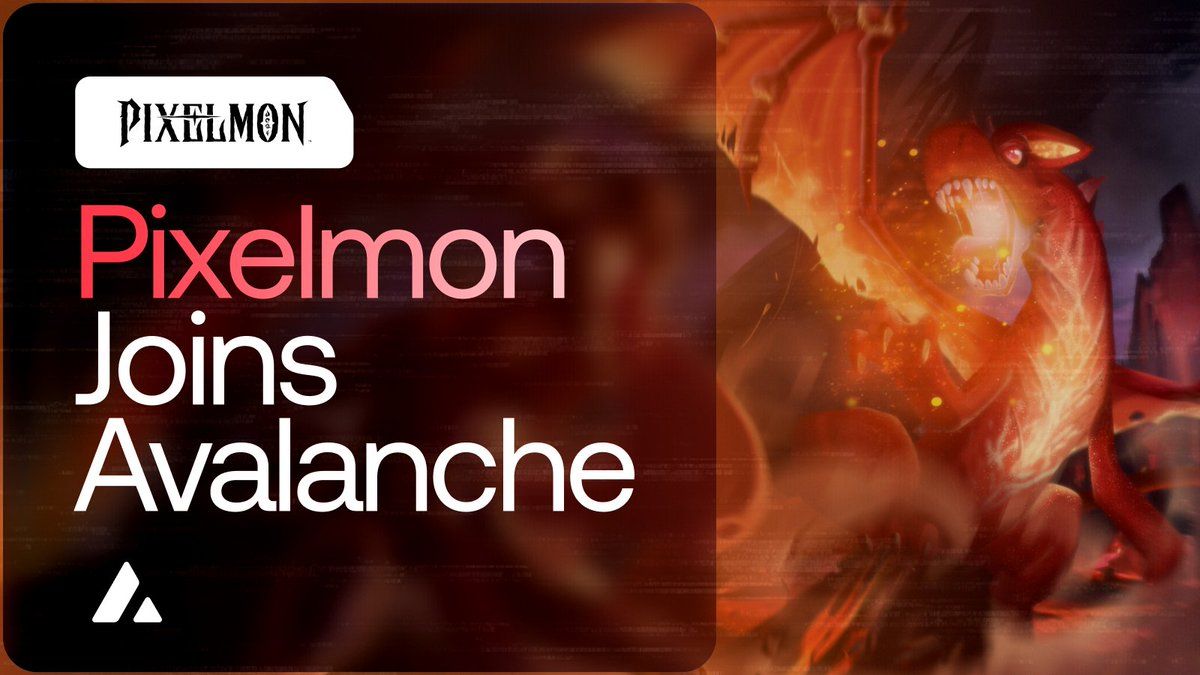



 Bitcoin
Bitcoin  Ethereum
Ethereum  Tether
Tether  XRP
XRP  Solana
Solana  USDC
USDC  Dogecoin
Dogecoin  Cardano
Cardano  TRON
TRON  Lido Staked Ether
Lido Staked Ether  Wrapped Bitcoin
Wrapped Bitcoin  Sui
Sui  Wrapped stETH
Wrapped stETH  Chainlink
Chainlink  Avalanche
Avalanche  Hyperliquid
Hyperliquid  Stellar
Stellar  Shiba Inu
Shiba Inu  LEO Token
LEO Token  Hedera
Hedera  Bitcoin Cash
Bitcoin Cash  Toncoin
Toncoin  Litecoin
Litecoin  Polkadot
Polkadot  USDS
USDS  WETH
WETH  Monero
Monero  Binance Bridged USDT (BNB Smart Chain)
Binance Bridged USDT (BNB Smart Chain)  Wrapped eETH
Wrapped eETH  Bitget Token
Bitget Token  Pepe
Pepe  Pi Network
Pi Network  Ethena USDe
Ethena USDe  Coinbase Wrapped BTC
Coinbase Wrapped BTC  WhiteBIT Coin
WhiteBIT Coin  Bittensor
Bittensor  Dai
Dai  Uniswap
Uniswap  Aave
Aave  NEAR Protocol
NEAR Protocol  Aptos
Aptos  OKB
OKB  Jito Staked SOL
Jito Staked SOL  Ondo
Ondo  BlackRock USD Institutional Digital Liquidity Fund
BlackRock USD Institutional Digital Liquidity Fund  Cronos
Cronos  Ethereum Classic
Ethereum Classic  Internet Computer
Internet Computer